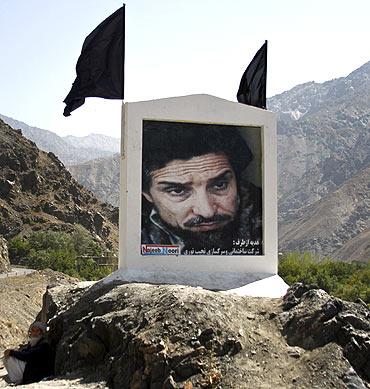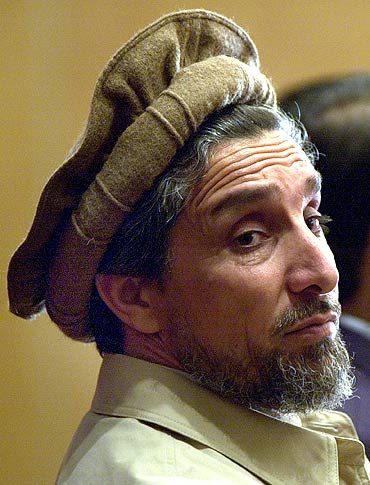
Today is a national holiday in Afghanistan as the country remembers Ahmad Shah Massoud, the brilliant military commander who was the nemesis of the Russians and the sole resistance against the Taliban.
Massoud was assassinated two days before terrorists took down the Twin Towers in New York.
Ten years ago, Ahmad Shah Massoud, the legendary Afghan military commander, was killed by Al Qaeda suicide bombers posing as journalists just two days before 9/11.
Massoud was known as the Lion of the Panjshir for playing a leading role in driving the Soviet army out of Afghanistan in 1989, bringing an end to the 10-year Soviet invasion.
The day of his death -- September 9 -- is observed as a national holiday in Afghanistan.
Massoud served as the military commander and political leader of the Northern Alliance which controlled parts of northeastern Afghanistan and led the only resistance against the Taliban.
After surviving several assassination attempts in his long fight as a guerilla leader, Massoud died in the helicopter en route to a field hospital in Tajikistan. The Al Qaeda bombers posing as journalists had hidden the bomb in a video camera and had waited three weeks before being granted an interview with Massoud.
Masood Khalili, currently the Afghan ambassador to Spain and for many years his country's envoy to India, was in the room with Massoud that fateful day and sustained grievous injuries.

Many saw Ahmad Shah Massoud as the only resistance against the Taliban and the best hope for Afghanistan. No other Afghan leader could match up to his stature and charisma during the Soviet invasion and since the rise of the Taliban in 1996.
Massoud is known to have defeated the powerful Soviet army nine times in the Panjshir Valley due to his brilliant guerilla tactics and strategy, making it impregnable for both the Soviets and later, the Taliban.
At his white stone mausoleum, visitors pay their respects; his tomb is being developed as a major tourist attraction.
After the Soviet-backed Mohammad Najibullah government collapsed three years after the Soviet withdrawal, Massoud became the minister of defence in Burhanuddin Rabbani's government amidst allegations of corruption in his ministry and causing civilian destruction in the fight for the control of Kabul.
Rabbani's government did not survive due to infighting and factionalism and Massoud returned to the Northern Province to fight the advancing Taliban.
Massoud had warned the West to put pressure on Pakistan to stop supporting the Taliban with aid and weapons. His killing is widely believed to be the precursor to the 9/11 attack on America by Osama bin Laden.
An ethnic Tajik, Massoud rejected the Taliban's version of Islam and was a devout Sunni Muslim. A lover of poetry, he was hardly ever seen without his trademark woollen cap.
In 2002, Massoud was nominated for the Nobel Peace Prize. His pictures are displyed prominently in Kabul and people come from different parts of the war-torn country to pay homage at his tomb, but his dream of a united Afghanistan is far from being fulfilled.